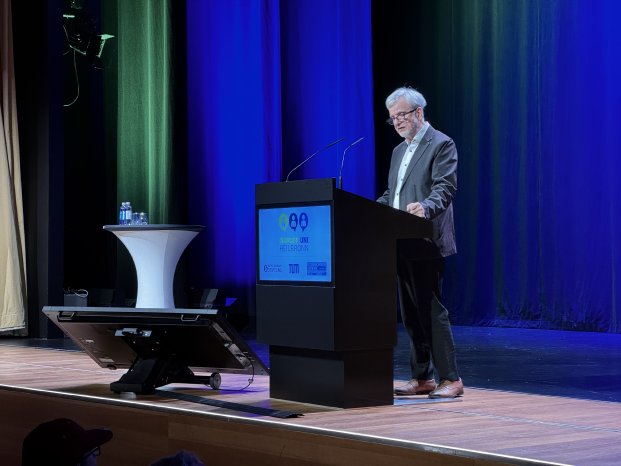Ortwin Renn is a professor of risk management and communication at the Research Institute for Sustainability (RIFS) at the Helmholtz Center in Potsdam. He is speaking at the 25th edition of the event, jointly organized by TUM Campus Heilbronn, Heilbronner Stimme and Dieter Schwarz Foundation, on “The Psychology of Risk”. Not all risks are the same – the audience quickly learns this at the event on the Bildungscampus Heilbronn, moderated by Tobias Wieland, editor at the “Heilbronner Stimme” newspaper. First of all, there are differences between rich and poorer countries: While smoking, alcohol, lack of exercise and an unbalanced diet have long since become major risk factors in rich countries, infections, malnutrition and accidents at work continue to pose major threats in low-income countries.
Imminent and subtle dangers
Risks differ not only from country to country, but also in the way they occur. There is the imminent danger, for example in the form of a nuclear power plant: this carries a high potential for disaster – but it is highly unlikely that the worst case scenario will occur. There are subtle dangers, which develop slowly and unnoticeablybut are nonetheless threatening such as climate and environmental changes. Repressed dangers in form of a constant threat can be blocked out to a point where they are no longer perceived as such – e.g. the risk of a flood disaster in regions with frequent flooding. And there are imagined dangers that don't actually exist but are repeatedly portrayed as a threat by certain actors.
People perceive risks differently and react to them in individual ways. Renn distinguishes between three types: the first type generally tends to trust other people. The second type, on the other hand, believes no one, tries to avoid every risk and sticks to the status quo – a way of thinking that right-wing extremist parties exploit. The third type wants to form an opinion based on certain – often superficial – characteristics of the actors involved. Generally speaking, some risks – such as the consequences of an unhealthy lifestyle – are suppressed, while others are overestimated or underestimated. Risks that are overestimated include artificial additives in food and cosmetics, crime and accidents at work. By contrast, the dangers posed by microorganisms, political upheaval and various interrelated crises are often underestimated.
Complex and conflictual
Renn focuses on the latter, the so-called systemic risks: they are characterized by their high complexity, do not stop at borders between countries or fields of expertise, and trigger insecurity and conflicts. Examples include ecological hazards such as climate change and the decline in biodiversity, economical and social threats such as corruption, political polarization and resurgent imperialism, as well as sociocultural modernization risks such as increasing inequality or the threat to cultural identities.
But what are the solutions to these enormous challenges? We need to use fewer resources and reconcile the goals of effectiveness, efficiency, resilience and social justice, Renn demands. He explains: “We can only solve these conflicting goals if the various ministries work together to find a solution that is not optimal for anyone, but is the best for everyone.” This is precisely why the traffic light coalition failed. Last but not least, we have to realize that life quality also depends on cultural identity and on our ability to shape politics, the environment and the future.
From the regulars' table to the round table
In concrete terms, this means that formats must be created to educate people about probability theory so that they better understand that “nothing is just black and white, good or bad, true or false.” Learning forums must be set up to enable people to deal productively with uncertainty and conflict. And perhaps most importantly, “we need political and social counseling that gives us all the opportunity to help shape our environment. We have to move from the regulars' table to the round table.” Renn has had good experiences with precisely these types of formats: ”When people are given the opportunity to participate in environmental planning, they often change their behavior and try to work out constructive solutions.”
The recording of the event can be found here. The next Bürger-Uni event will be on March 19, 2025, with Prof. Simone Linke. She will be talking about “The green city of the future”.


